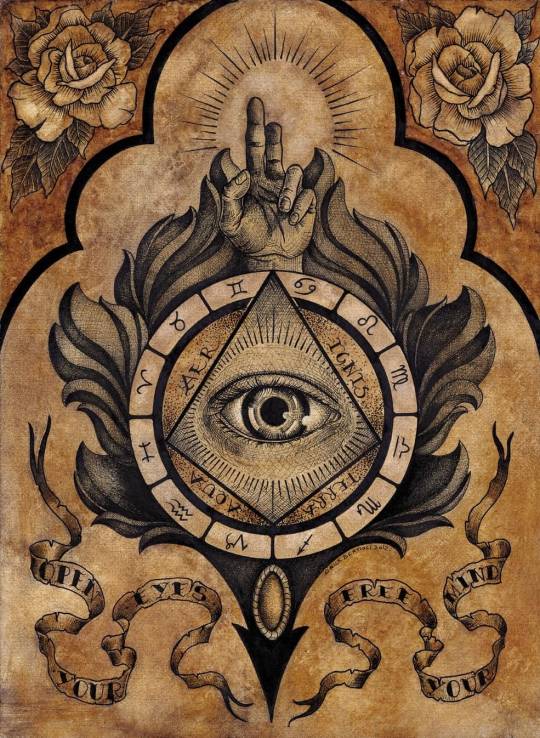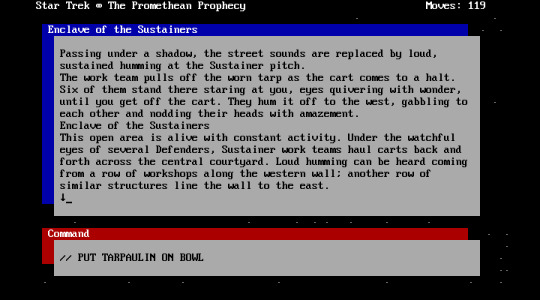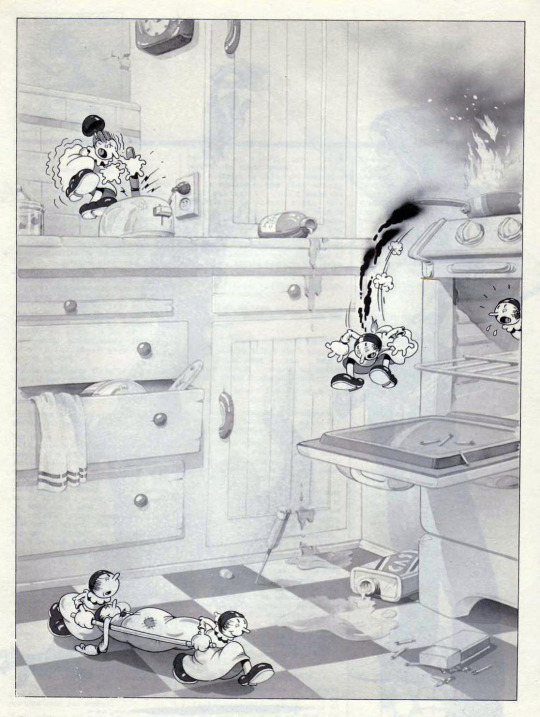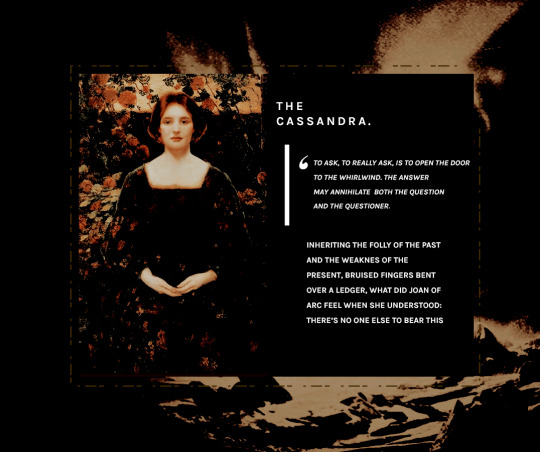#promethean enterprises
Photo

Rick Griffin (1944-1991), ''Promethean Enterprises'', #1, 1969
Source
#rick griffin#american artists#promethean enterprises#comic covers#cover art#underground comix#independent comics
839 notes
·
View notes
Photo


Open Your Eyes, Free Your Mind
Nick Bertoli
Promethean Enterprises #3, 1971 'When you see a UFO, smile and wave'
133 notes
·
View notes
Text

'When you see a UFO, smile and wave'
Promethean Enterprises #3, 1971
7 notes
·
View notes
Text
Star Trek: The Promethean Prophecy
Original Release: 1986
Developer: Trans Fiction Systems
Publisher: Simon & Schuster
Original Platform: DOS

Compared to The Kobayashi Alternative, this is a much more standard text-based adventure game. After a brief battle with a Romulan Bird of Prey, which you can’t target unless you ask Spock for help (the only clue to needing Spock is that your new science officer is terrified), the Enterprise needs to make slow repairs, but is out of food. The nearest Federation ship is a few years away, so your only hope is the nearby planet.
When you land, you find out about a prophecy that the Enterprise crew are supposed to be part of, so you have to solve this new mystery as well as food on this desert planet.
While it’s nice to have a big of focus on one planet, the lack of exploring different places makes this feel more generic. You also need to often perform actions that the manual and help don’t specify, such as overloading a phaser. A large part of the game also involves trading, but the items you receive are random, so you need to repeat the action until you have what you need.
This has an interesting story, but the game itself isn’t that good.
#star trek#star trek tos#text adventures#text games#retro games#star trek video games#star trek gaming
5 notes
·
View notes
Text
U.S. Education Market Share Likely to Expand At a CAGR of 4.2% By 2030
The U.S. Education Market was estimated at USD 1.4 trillion in 2021 and is anticipated to reach around USD 3.1 trillion by 2030, growing at a CAGR of roughly 4.2% between 2022 and 2030.
The U.S. Education Market research report offers an in-depth analysis of the U.S. market size, which is further segmented into the regional and country-level market size, and segmentation market growth. Also, it provides the market share, sales analysis, competitive landscape, the impact of domestic market participants, trade regulations, value chain optimization, recent key developments, strategic market growth analysis, opportunities analysis, product launches, and technological innovations.
Sample at: https://www.custommarketinsights.com/request-for-free-sample/?reportid=16780
U.S. Education Market: Overview
Post-COVID-19 the education sector in the U.S. has undergone several transformations and has turned more receptive to student needs. Many facets of online programs have begun to provide full-fledged quality education in the U.S. right from junior level to high level.
During the crisis scenario, the majority of educational institutions witnessed a huge decline in academic enrollments therein affecting the revenue and cash flow. As a result, a majority of the institutions offered waivers, discounts, and other forms of offers that would help them retain the enrollments. Going forward, as the U.S. market is reviving from the shock waves of the pandemic, digitalization in the education sector in the U.S. offers lucrative opportunities.
Growth Factors
The U.S. Education Market is propelled by the increase in the prevalence of SMART technology, the rise in consumer income, and quality spending on education. The presence of world-class technology is one of the crucial factors in the growth of the U.S. market.
The market size is projected to gain upper traction in the coming years owing to the adoption of new technologies and the increase in the importance of education in the U.S. With the shift in the consumer mindset, the education sector in the U.S. is projected to witness massive expansions in the forthcoming years.
Besides, the adoption of novel technologies at the University level has enabled a wider reach for remote students. For instance, Universities in the U.S. are imparting education in online mode to foreign students. This has added to the manifold growth of the education sector in the U.S. On the other hand, growing expertise in teachers is adding more to the educational quality and reliability.
Key Players Insights
Competitive Landscape/ Key Players Insights
Our market analysis of the U.S. Education Market also involves a separate section dedicated to major players operating in the market. Our analysts offer an understanding of the financial statements of all the key participants, together with their product portfolio and SWOT analysis. Moreover, the report also offers a competitive landscape chapter, including strategic key development, market share, as well as U.S. market ranking analysis of the players mentioned. Additionally, we offer our clients the leverage to modify the list of players mentioned in our report as a part of our free customization.
Report at: https://www.custommarketinsights.com/report/u-s-education-market/
Some of the prominent players in the U.S. Education Market are
Smart Technologies
Wall Family Enterprise
Adobe Systems
Pearson Plc
Tata Interactive Systems
Saba Software
Promethean Inc.,
AWE Acquisitions
Cisco
Others
The U.S. Education Market is segmented as follows:
By Technology
Cloud
On-premise
By Content
Audio-based content
Text content
Video-based content
By Smart Learning
Simulation-Based Learning
Social Learning
Blended Learning
Webinars
Others
By Component
Service
Hardware
Software
By Region/Geography
North America
The U.S.
0 notes
Text
Naruto as a Romantic Hero
Preface: I do not mean to insinuate Kishimoto intentionally infused Romantic values into Naruto. I just want to read the series through a Romantic lens.
Pt 1: Rejection of Custom
To start, We will define the Romantic hero in contrast to the epic hero. Here is a quick definition from cliff notes.com:
Both epic heroes and Romantic heroes are usually the main protagonists in literary works. An epic hero is from history, a myth, or a legend. He is often somehow connected to a god (or is often even the son of a god, such as Zeus), although he lives his life among mortals. Note that epic heroes do not have godlike power, but they are smarter, braver, and stronger than the average person. The epic hero is usually on a quest or voyage, where he faces trials and adversaries that change him in ways that reflect the morals and values of the society from which he came. Some examples of epic heroes are Achilles, Perseus, Hercules, Odysseus, and Beowulf.
https://www.cliffsnotes.com/cliffsnotes/subjects/literature/what-are-the-differences-between-an-epic-hero-and-a-romantic-hero
One of the major heroes of the Romantic movement was Prometheus from Greek Mythology. Prometheus symbolized many Romantic values. For example, Zeus’ society cast out Prometheus. More importantly, Prometheus symbolized an important aspect of Romanticism: “Rebellion” against societal authority and conventions:
In the Romantic period it was not difficult to enlist the heroic enterprise of Prometheus as a way of understanding the role of the Romantic hero. In the revolutionary climate of the late eighteenth and early nineteenth centuries, the Romantic artist is often seen as a Promethean figure who, resisting the oppressive forms of society and fired by imagination, foresees a future in which all such repression will be overthrown.
https://www.yorknotes.com/undergraduate/english-literature/romantic-literature/study/critical-theories-and-debates/03020400_heroes-and-antiheroes
We can sketch out a rough idea of the Romantic hero when we inspect this line about the epic hero: “ [the epic hero] faces trials and adversaries that change him in ways that reflect the morals and values of the society from which he came” (cliff notes). Prometheus, and by extension the romantic hero, does the opposite of the epic hero. The Romantic Hero, at least in my understanding , rejects the values of their dominant society. In Prometheus’ in universe case, he rejects Zeus’ notion that humans are unworthy of divine kindness.
Like Prometheus, Naruto rejects the conventions of his society—or at least he did before the ending botched this theme. During the Zabuza arc, Kakashi and Zabuza both tell Naruto that ninja are nothing more than tools-often of hatred. Naruto rejects this notion and swears to build his own ninja creed. During the end of pt 1, Jiraiya tells Naruto that he must grow out of his foolish and youthful idealism. Naruto rejects this notion and swears to stick by this idealism forever. During the pain arc, Ino’s father tells Naruto that he can’t resolve the conflict with Nagato with words; he must use force. Naruto rejects this notion, and tries to resolve the Nagato problem non violently. Nagato tells Naruto he cannot form true peace due to the accursed nature of humanity. Naruto swears he will break humanity’s curse and find true peace.
In the poem, Byron tells the reader that Prometheus bravely defied the “tyranny of fate” and the “ruling pricnincple of hate” and encourages the reader to follow Prometheus’ example:
Thou art a symbol and a sign /To Mortals of their fate and force; /Like thee, Man is in part divine, / A troubled stream from a pure source; / And Man in portions can foresee /His own funereal destiny; /His wretchedness, and his resistance, /And his sad unallied existence: /To which his Spirit may oppose Itself/—and equal to all woes,
Naruto’s vow to Nagato bears striking resemblance to Prometheus struggle against humanity’s “fate of hatred”. Nagato tells Naruto that humanity is destined and cursed to be ruled by hatred. Naruto vows he “will break that curse one day“ and create true harmony, just like how Prometheus defied ”the ruling principle of hate-The Gods’ contempt for humanity and fate‘s decree that mortals must unconditionally submit to the Gods’ authority-to create a more just world for humanity.
It’s important to note that this story beat reflects an important part of Kishimoto: he draws heavy influence from Buddhism. Naruto’s vow to break Nagato’s cycle of hatred reads as an allegory for a Buddhist taking up the Bodhisattva vow to free all sentient beings from Samsara. I plan to do a Buddhist read of the text in the future and expand on the Pain arc’s Buddhist themes.
Furthermore, I realize many ppl say The child of prophecy, Indra Ashura, and Kaguya beats undermine this anti fate theme. While I do agree partially, I think the presence of Kishimoto’s Buddhist, Shinto, Taoist, and Hindu subtext complicates the matter to say the least.
0 notes
Photo

Original illustration by Rick Griffin from Promethean Enterprises #1, 1969.
178 notes
·
View notes
Text
Since it got delayed again I feel like talking about my VTM 5E Chronicle
The Setting: New Jersey
Background Plot: NJ is under firm control of the Anarchs, NYC is Camarilla, and for roughly 30-odd years, both normally opposing factions have had a lasting neutrality after driving the Sabbat from both states. In the last 20, the Thin Bloods and Catiff came together to declare Pennsylvania a place for their kind, and have provided harbor for outcasts of supernatural society.
The Players on the stage:
Damon Mckenzie a Brujah trying to follow more Promethean traditions. Hailing from a military family he enlisted to serve in Vietnam, where his CO decided to embrace him. Returning to Jersey he maintained a pawn shop with his brother, and otherwise did vigilante work, most notably against a powerful crime family on the East coast. One night during a weapons exchange on the Delaware River his body was damaged and he entered torpr, sinking into the water, only to surface 20-odd years later. Now he needs to settle back in, try to get back the “life” he had, all while adjusting to new changes.
Kaden Sakuraba a Catiff from California. The youngest of the roster, he’s only been Kindred for seven years, and in all that time he’s dreamed of returning to his humanity. He left for New Jersey to avoid his one true love, fearing he might bring her harm and deciding to find his solution far from her. Currently a drifter with a penchant for brutal justice, he’ll find more than a few reasons to stay in NJ.
Shinku Karmesinrot a classic Ventrue from NYC. His sire once controlled the largest crime syndicate on the East Coast, until a series of vigilante attacks caused the empire to crumble to dust. As Anarch Jersey is filled with gangs, he sees his time to coral them and rebuild the family tradition. A master of manipulation perfectly groomed to take back what he considers his lost legacy, he’s left his human wife and Sire back in NYC.
Chiara Pleiade Lee a less than classic Ventrue, and Shinku’s Childe. The loyal, obsessive maid turned ally or pawn in the bid to rebuild the criminal enterprise. The two objects of her unhealthy fixation are her master, and firearms. Perfectly built to be the jelly to his peanut butter. Where the master is intimidation and violent coercion, she is charm and subterfuge.
As is tradition to those new in a city, or returning after a long absence, all of them will meet at the Baron’s Nightclub to announce their presence to the man in charge. Will their night go according to plan, or will the wheels of fate turn, causing them to unite, if only briefly?
5 notes
·
View notes
Photo


Bob Zoell, ‘Kitchen Safety’, ''Promethean Enterprises'', #5, 1970
Source
328 notes
·
View notes
Text
Green Growth

In 1972, the Club of Rome published "Limits to Growth," which used pretty straightforward modeling to predict that the world's productive capacity would be exhausted soon.
https://en.wikipedia.org/wiki/The_Limits_to_Growth
But over the years, the limits in Limits to Growth have proven to be more complicated. Capitalists have many failings, but one thing that they can be relied upon to do, wherever possible, is reduce the costs that they incur.
Oftentimes, cost reductions can be realized by externalizing: polluting, overseas dumping, exploiting labor. Sometimes, cost reductions come from reducing quality or quantity while holding prices steady.
Our electronics are cheaper because they're made by companies in China whose labor practices drive employees to suicide. When they were made by unionized labor onshore, they cost more.
https://en.wikipedia.org/wiki/Foxconn_suicides
For years, the late, lamented Consumerist blog documented the "Grocery Shrink Ray" whereby common packaged goods got smaller while their prices held steady.
https://consumerist.com/tag/shrink-ray/index.html
Meanwhile, the private equity fuckwits who took over J Crew destroyed its staples like the Cece ballet flat, replacing the stitching with glue and substituting inferior materials - increasing profits by cutting costs without cutting prices.
https://www.npr.org/transcripts/861378110
But capitalists also realize savings by redesigning products so that they they use less labor, energy and materials. Compare a stone house to a modern efficient home: the labor, energy and material inputs per cubic meter have been in freefall for generations.
It's not because capitalists are environmentalists, it's because they're cheap. I love this study of Ikea catalogs that found that the SKUs that endure become more materially efficient over time:
https://www.frbsf.org/economic-research/files/BaxterLandry.pdf
The Billy bookcase you bought this year is visually and functionally equivalent to the ones I assembled at a bookstore in 1991, but they're lighter (less material), pack smaller (eking out improvements in the knapsack problem), and are composed of parts from fewer suppliers.
The same is true of cars, clothes, and other categories of goods. Capitalism doesn't care how it reduces costs (material, energy and labor are the major costs), and it uses a mix of benign and harmful techniques to achieve these reductions.
All of this leads capitalism's true believers to conclude that capitalism is compatible with planetary survival: left to its own devices, capitalist's cheapness will reduce material and energy inputs, and the carbon footprint of our goods will fall even as our economy grows.
One such believer is MIT Sloan's Andrew McAfee's "More From Less: The Surprising Story of How We Learned to Prosper Using Fewer Resources—and What Happens Next."
https://www.simonandschuster.com/books/More-from-Less/Andrew-McAfee/9781982103576
McAfee's critics say he has it wrong. As Nafeez Ahmed writes in Motherboard, "scientific analysis by a group of systems scientists and economists who have advised the United Nations seems to pull the rug out from under this entire enterprise."
The critique is "Raising the bar: on the type, size and timeline of a 'successful' decoupling," published in
Environmental Politics.
https://www.tandfonline.com/doi/abs/10.1080/09644016.2020.1783951?journalCode=fenp20&
(Here's the Sci-Hub mirror:)
https://sci-hub.tw/downloads/2020-06-25//95/[email protected]
The authors say McAfee cherry-picks his stats, missing instances in which the growth that seems to happen without increased consumption is actually just externalizing - consuming resources somewhere else, off the manufacturer's books (but still on Earth's ecological ledger).
They also say that McAfee fails to acknowledge that even where there's growth without increased consumption, that there's a Red Queen's Race: when things get cheaper (because of increased material/energy efficiency), we buy more of it.
This is a familiar pattern: making it easier to travel increases traffic, which erases the gains from the new travel method. Uber and Lyft first increased mobility in cities, then they paralyzed them:
https://www.sfgate.com/technology/article/Uber-Lyft-San-Francisco-pros-cons-ride-hailing-13841277.php
It's why traffic speeds in London today are barely faster than they were in the pre-internal combustion era.
https://www.forbes.com/2008/04/21/europe-commute-congestion-forbeslife-cx_po_0421congestion.html
The critique of "uncoupled" growth is correct, but incomplete.
It's easy to imagine a city that uses internal combustion for mass transit but not private cars - and massively increases landspeed relative to horses.
The barrier to such a city isn't tech or economics: it's ideology. No one came down off a mountain with two stone tablets saying "Thou shalt own a personal automobile." Rather, car companies corrupted urban planning to reduce transit and make us reliant on cars.
Likewise, it's possible to imagine an economic system in which manufacturing relentlessly reduces material/energy inputs while banning externalizing (cheating) and limiting new consumption.
Leigh Phillip's "Austerity Ecology & the Collapse-Porn Addicts" describes this in detail. It's a call for a Promethean Left that demands technology to sustain the planet while giving peasants the lives of lords, not reducing lords to peasants.
https://boingboing.net/2016/01/12/keep-your-scythe-the-real-gre.html
If we can reform our ideology to prevent capitalism from wrecking the planet, why stop there? Why not harness technology to give us better allocations that enable plenty without waste?
https://locusmag.com/2017/03/cory-doctorow-the-jubilee-fill-your-boots/
26 notes
·
View notes
Text

so anyway here's my DS9 s/i, Stardust (keeper of the stars)
he's a manslut! i am not kidding, he dresses like one, acts like one, talks like one, etc.
when he originally joined Starfleet, he was placed on the first Enterprise (he adored Dr. McCoy and considered him his closest friend). he ended up leaving Starfleet after a few years to explore by himself some more
when the second Enterprise was up and running, he rejoined Starfleet so he could get on it, and he succeeded. he served with them until the whole Borg fiasco, and then got put on Deep Space 9 when Starfleet "took over" it
he's a Promethean, obviously, but he tends to look more "human" when working on DS9 (they know he isn't human, but they don't know he looks like That)
1 note
·
View note
Photo

THE CASSANDRA.
— NAME: NOÉMIE COLETTE LÉON.
— AGE: 30.
— GENDER: cis female.
— ROLE: crew, overseer.
— FACE: annabelle wallis.
Your father was the broker who insured The Agathe’s construction: for a while, that was the only story you ever had. Unlike the Promethean, the Agathe was never a royal ship, but an enterprise sponsored by a bourgeoisie and well-heeled traders: men who hoped to make their mark for France as none had done since the Revolution. This, too, was supposed to be your family’s chance - the moment of seizing what you were led to believe you deserve, in a world which toppled over more times than one can count. But then, two weeks before the journey would set off from Marseille, your father passed away. There was no one else in your family skilled enough (and gullible enough, you suppose, in hindsight) to oversee the rest of the task: the expedition itself. So you boarded the Agathe, a mantra of self-resilience on your lips. You had a burning desire to prove what people like you can do, even when pitched against all the nations and nobility of the world. Where are those embers now? What spark could ever light them anew?
CONNECTIONS.
✹ THE ENIGMA — You knew them in another life, when the strained relations between France and England could easily be circumvented by those wealthy enough to desire it. You can recall their features in a blur of nostalgia and regret. Or perhaps such a meeting never was; after so many mirages, what is one more betrayal of memory or sight?
✹ THE JUDAS — When disaster began to strike - or, rather, to wrap around all of you like a lover’s hands - you knew you had to seek their protection. Yet as things took a turn for the worse with the removal of Le Capitaine, the roles reserved. It was you who had to wear the scepter of caution and control. Do you resent them that? Or do you understand what it means for someone to reach the dregs of their courage and find them drained?
✹ THE AMULET — There are many burdens in this world, and many ways to shoulder them. Her way of helping you bears a different nature from how The Volcanic supports the Judas, yet its force is no less formidable. Her nurturing calm, her determination to never lose faith, becomes a geyser. Nothing can rival the ice now; but her warmth almost does.
This skeleton is TAKEN by Trixie.
6 notes
·
View notes
Photo



July 4, 1845
Godhavn
Aboard the ruddy ship
Tom, Sammy boy,
Well, we’ve officially reached the very edge of civilization. How best to describe it to you, when you know by now that my tongue is best suited to tales of blood and guts upon the field of battle? I think the best course of action would simply be to open the top drawer of your chest, remove the letters from my time in Cairo that I know you both still keep, and simply replace any descriptors of the desolation of desert sand with ice and snow.
But then again, perhaps that would be doing this place a disservice, somewhat. There is beauty here, and I even I, who lacks so much in terms of vocabulary and artistic vision, am not completely blind to it--the ship’s doctor, as wonderful and knowledgeable a companion as I have ever had the pleasure of meeting, never ceases in his careful explanation to me of all of the natural phenomenon that only exist in this particular climate. It is a strange thing--my paltry tales of different appointments pale in comparison to every word that falls so easily from the man’s mouth, and yet he listens rapt every time I offer one like a poor beggar, as thanks for his kindness and tutelage. The sky also does wonderful things at night, as if God was putting on a show for our benefit--a reward for our bravery, perhaps, in crossing that threshold between known and unknown, for besides the native people and the citizens of Godhavn, there is a chance that we will be the only ones to ever see such a thing.
As for myself, I am as well as could be expected. I like the cold, I find it bracing in comparison to the relentless abrasive heat of the Egyptian sun on the back of my neck. The men under my command are hale and certainly up to the task--and I cannot express how good it is to turn around and find my dear Vladya and August again at my right and left hand. Tell Mother and Father that I shall do my best to keep myself in good order, and shall endeavor not to do anything too reckless--and if needs be, I shall turn the task to them of looking after me. They are the only two people on the face of this globe that I would trust with the duty besides yourselves.
If this goes well, I think I shall recommend them both for every commendation and promotion I can conceive of.
Give Mother and Father my love, as well as your darling wives--tell them not to mourn in the absence of someone to fuss over, and that for now the Arctic is as good and hearty a bride as either of them could have conjured to conveniently fling into my path. Tell your sprogs as well that I’ll bring them back a prize each--something from the Arctic that no other child could ever lay claim to, courtesy of their favorite uncle Jack. Hector, should receive my love next--give him the finest apple and sugar cube and pet his nose gently, tell him not to mourn my absence too fiercely, and that I look forward to meeting all of the grandchildren he’ll sire while I am away.
And do take care of yourselves, gentlemen, above all else--you remain ever present in my thoughts, and I could not imagine undertaking such an enterprise without the knowledge of your undying support.
All my love,
Sgt. Jack Fox
Her Majesty’s Royal Guards
HMS PROMETHEAN
#thqtask#i'm rather proud of my brother casting tbqh#also jack king of saying everything and nothing at all about how he's actually doing
6 notes
·
View notes